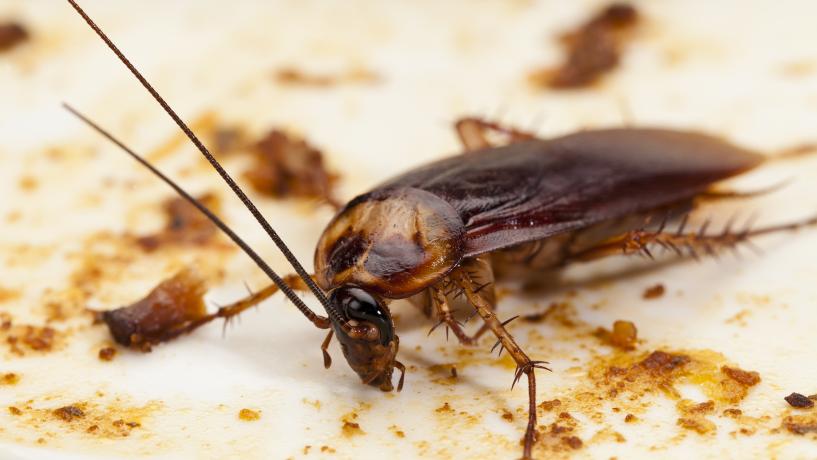
Cockroaches are notoriously hard to get rid of, and it’s about to get worse.
According to a new study carried out by scientists at Purdue University, cockroaches have become so resistant to pesticides and insecticides, they’re nearly impossible to eradicate with chemicals alone. Not only that, but in some cases, exposure to insecticides can actually cause roach populations to increase.
The study, led by Michael Scharf, a professor of entomology at Purdue University, and his colleague, O.W. Rollins, tested three common chemical-based approaches on cockroach-infested apartment complexes in Indiana and Illinois over a six month period.
In each location, cockroaches were captured and lab-tested prior to beginning the study to determine the most effective insecticides for each treatment.
“If you have the ability to test the roaches first and pick an insecticide that has low resistance, that ups the odds,” said Scharf. But even then, the team had difficulty controlling roach populations.
Depressing results
In a treatment where researchers rotated three different classes of insecticide — one each month for three months and then repeated — cockroach populations held steady over a six-month period, but did not reduce.
In a treatment where they used a mixture of two different insecticides, the roach population boomed; this is particularly disturbing because it’s such a common method of extermination.
The theory is that by using a mixture of two different classes of insecticide, the percentage of cockroaches that are resistant to one type of insecticide will be wiped out by the other. In reality, it may actually be contributing to near-indestructible colonies of pesticide-resistant cockroaches.
In a single-insecticide treatment on a colony which had shown low resistance to a particular chemical, researchers were able to almost eradicate the colony; however, when they used the same approach with a different insecticide, the roach population increased.
“We found that only one of the housing sites with the single-insecticide treatment actually gave a good result,” Scharf explained in a recent interview. “[In all other treatments], the cockroaches either held stable or increased in number, which was kind of depressing.”
Unprecedented levels of resistance
No matter how many roaches Scharf and his team managed to kill, they always came back. Cockroaches that survived an insecticide treatment not only developed resistance to that insecticide, but some of them even became immune to other insecticides and pesticides not used in the treatment, a phenomenon known as “cross-resistance”.
"It's explainable kind of at the molecular level," said Scharf. "You can have a type of physiological mechanism that just gives resistance to lots of different types of insecticides."
In lab tests on the remaining cockroaches, researchers found that cross-resistance likely played a significant role in their poor eradication results.
It works like this: cockroaches who are resistant to a particular insecticide survive the treatment and sometimes gain resistance to other insecticides through cross-resistance; then, they pass this immunity along to their offspring (and their offspring’s offspring).
A single female cockroach can produce 200 to 300 offspring in her short lifetime, which means that if even a small percentage of cockroaches is resistant to an insecticide, and those cockroaches gain cross-resistance, a population knocked down by a single treatment could explode again within months.
“We [saw] resistance increase four- or six-fold in just one generation,” continued Scharf. “We didn’t have a clue that something like that could happen this fast.”
Diversified approach
Cockroaches are serious threats to human health. They carry dozens of types of bacteria, such as E. coli and Salmonella, that can cause food-borne illness and the saliva, faeces and body parts they leave behind can trigger asthma and/or allergy symptoms.
Food businesses in particular could have a lot to lose if cockroach populations become immune to chemical eradication methods.
Pest infestation is one of the most common reasons why restaurants and other food businesses are fined or shut down by public health authorities. Pests — especially cockroaches — are also heavily stigmatised, so even one sighting of a cockroach in your dining area could send customers running out the door.
It’s extremely important for food businesses to have a comprehensive pest control plan and to follow the procedures therein to the letter. Everybody in the business should be trained in proper cleaning and sanitising techniques, and general cleanliness and sanitation must be held to the highest standard, especially as traditional pest eradication methods become less effective.
According to Scharf, a diversified pest management strategy is the way forward, and he suggests combining chemical treatments with traps, improved sanitation and vacuums that can remove cockroaches.
“Some of these methods are more expensive than using only insecticides, but if those insecticides aren’t going to control or eliminate a population, you’re just throwing money away,” he said. “Combining several methods will be the most effective way to eliminate cockroaches.”
Of course, prevention is a much better strategy than eradication — perhaps now more than ever. Find out how to keep cockroaches out of your food business, how to identify signs of an infestation and learn about common methods of eradication in the Food Safety Supervisor Guide to Pest Prevention and Control.





